The Viral Molecular Diagnostics Market is estimated to be valued at USD 11.1 billion in 2025 and is projected to reach USD 26.9 billion by 2035, registering a compound annual growth rate (CAGR) of 9.2% over the forecast period.
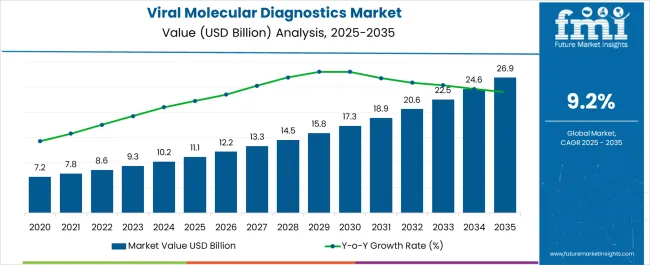
| Metric | Value |
|---|---|
| Viral Molecular Diagnostics Market Estimated Value in (2025 E) | USD 11.1 billion |
| Viral Molecular Diagnostics Market Forecast Value in (2035 F) | USD 26.9 billion |
| Forecast CAGR (2025 to 2035) | 9.2% |
The viral molecular diagnostics market is experiencing strong growth, supported by the rising prevalence of viral infections and the need for rapid, accurate, and cost-effective diagnostic solutions. Demand is being reinforced by advancements in molecular technologies that enable precise viral detection at early stages, improving patient outcomes and supporting effective disease management.
Increasing global focus on pandemic preparedness, coupled with the expansion of healthcare infrastructure in both developed and emerging regions, is accelerating the adoption of advanced diagnostic platforms. The integration of automation, digital workflows, and high-throughput testing capabilities is reducing turnaround times, making molecular diagnostics more accessible and scalable for laboratories and healthcare systems.
Regulatory support for faster approvals of diagnostic assays and growing public health initiatives to strengthen surveillance networks are also contributing to market expansion With the growing emphasis on precision medicine and the role of molecular diagnostics in guiding treatment decisions, the market is expected to witness sustained growth, driven by continuous innovation, rising awareness, and increasing investments in research and development across the healthcare sector.
The viral molecular diagnostics market is segmented by product type, application, end user, technology, and geographic regions. By product type, viral molecular diagnostics market is divided into PCR-based Diagnostics, Next-Generation Sequencing, Microarray Diagnostics, Isothermal Amplification, and Others. In terms of application, viral molecular diagnostics market is classified into Infectious Disease Detection, Oncology, Genetic Testing, Blood Screening, and Others. Based on application, viral molecular diagnostics market is segmented into Infectious Disease Detection, Oncology, Genetic Testing, Blood Screening, and Others. By end user, viral molecular diagnostics market is segmented into Hospitals, Diagnostic Laboratories, Academic and Research Institutes, and Others. By technology, viral molecular diagnostics market is segmented into Real-time PCR, Digital PCR, Sequencing, Hybridization, and Others. Regionally, the viral molecular diagnostics industry is classified into North America, Latin America, Western Europe, Eastern Europe, Balkan & Baltic Countries, Russia & Belarus, Central Asia, East Asia, South Asia & Pacific, and the Middle East & Africa.
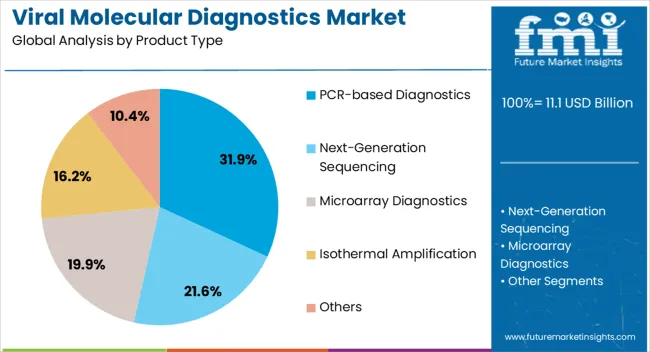
The PCR-based diagnostics segment is projected to hold 31.9% of the viral molecular diagnostics market revenue share in 2025, positioning it as the leading product type. This leadership is attributed to its unmatched sensitivity and specificity in detecting viral genetic material, which ensures accurate results even at low viral loads. The ability of PCR technology to rapidly amplify viral nucleic acids has made it the standard for a wide range of diagnostic applications.
The segment is benefiting from continuous advancements in real-time PCR and multiplex PCR platforms, which allow simultaneous detection of multiple pathogens in a single test, enhancing efficiency and reducing costs. The growing need for early detection of viral infections, particularly in clinical settings where timely treatment decisions are critical, is reinforcing adoption.
Additionally, the widespread availability of PCR instruments and reagents across global markets is supporting accessibility and scalability As laboratories and healthcare systems prioritize rapid and reliable diagnostics, the PCR-based diagnostics segment is expected to maintain its dominant market share.
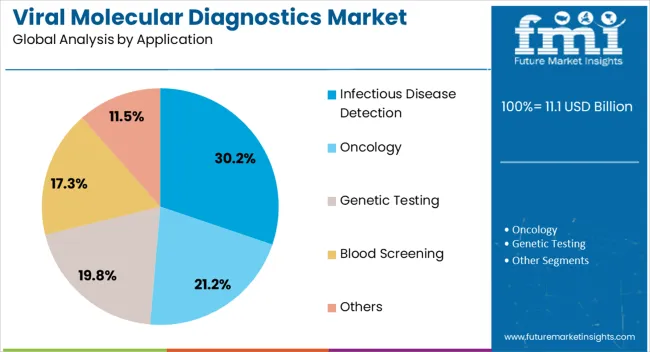
The infectious disease detection segment is also projected to capture 30.2% of the viral molecular diagnostics market revenue share in 2025 under a different application scope, highlighting its widespread influence across use cases. Its dominance in this category is being reinforced by the integration of molecular testing into large-scale screening programs, particularly in regions where viral outbreaks are frequent.
The segment is benefiting from the increasing reliance on molecular assays for guiding treatment strategies, improving patient outcomes, and reducing healthcare costs through faster and more precise detection. Advancements in automation and next-generation sequencing integration are further enhancing diagnostic accuracy and efficiency in infectious disease detection.
The segment’s growth is also being supported by public health initiatives aimed at strengthening diagnostic capacity for early outbreak identification and management As the global healthcare ecosystem continues to prioritize preparedness against viral threats, infectious disease detection through molecular diagnostics is expected to remain at the forefront of innovation and adoption, consolidating its share in the market.
Molecular diagnostics is a technique to analyse individual's genetic code and to diagnose various diseases and monitor the risk factors associated with the diseases. Molecular diagnostics has revolutionized the field of medicine by introducing a several and improved testing methods for a wide range of diseases. The branch of molecular diagnostics that deals with the screening and detection of viral diseases and its causative agents is referred as viral molecular diagnostics.
Presently, there are numerous viral diseases that are prevalent worldwide, which needs proper diagnosis for providing better treatment options to the patients. Thus viral molecular diagnostics is increasing being adopted in various healthcare service settings. Secondly the technique also has increased adaptability in the field of personalized medicine.
The viral molecular diagnostics test are conducted with the help of polymerase chain reaction (PCR), nucleic acid sequence based amplification, Real time PCR (RT-PCR) and other molecular diagnostic methods.
The key driving factor for the growth of the viral molecular diagnostics market is the increasing prevalence of viral diseases like AIDS, Hepatitis, influenza, rising geriatric population, increasing popularity of minimally invasive procedures, changing methodologies for disease diagnosis and rising awareness about viral diseases and increasing government funding in various regions.
Aged individuals have lower immunity and thus are more prone to various viral diseases. This will create more demand for the diagnostic procedures, thus, drive the growth of molecular diagnostics market. However lack of skilled professionals, high cost of molecular diagnostics and constraint operational efficiencies are some of the major factors confining the growth of the global viral molecular diagnostics market.
Viral Molecular Diagnostics Market is growing at a significant rate. The market would foresee a significant growth over the forecast period due to increasing investments in R&D for personalized medicine. Secondly the market is expanding globally due to rising awareness of the viral infections. Thus the market is expected to grow with a decent CAGR.
Advances in biotechnology often cater to the demand for new vaccines, new drugs for various viral infections, thus ultimately fuels the growth of the viral molecular diagnostics in research and development activities market over the forecast period.
Geographically, North America is the largest market for the viral molecular diagnostics, due to increasing number of players within this market. The market is closely followed by the Western European market. Better infrastructure and highest awareness levels about various viral diseases among the population of the regions are the major factors responsible for their highest share.
Asia-Pacific is the fastest growing market for various viral molecular diagnostic tests, due to increasing prevalence of viral infections in this market.
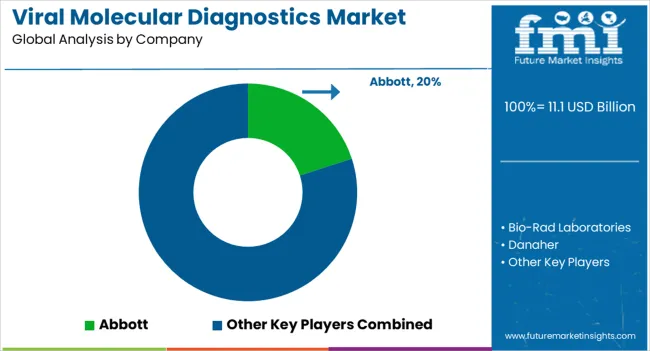
Leading players in viral molecular diagnostics market include Abbott Laboratories, Inc., Affymetrix, Inc., Auto Genomics, Inc., Becton Dickinson and Company, bioMérieux SA, F. Hoffmann-La Roche Ltd., Illumina, Inc., Meridian Bioscience, Inc., Qiagen NV, Thermo Fisher Scientific Corporation and others.
The research report presents a comprehensive assessment of the market and contains thoughtful insights, facts, historical data, and statistically supported and industry-validated market data. It also contains projections using a suitable set of assumptions and methodologies. The research report provides analysis and information according to categories such as market segments, geographies, types, technology and applications.
The report is a compilation of first-hand information, qualitative and quantitative assessment by industry analysts, inputs from industry experts and industry participants across the value chain. The report provides in-depth analysis of parent market trends, macro-economic indicators and governing factors along with market attractiveness as per segments. The report also maps the qualitative impact of various market factors on market segments and geographies.
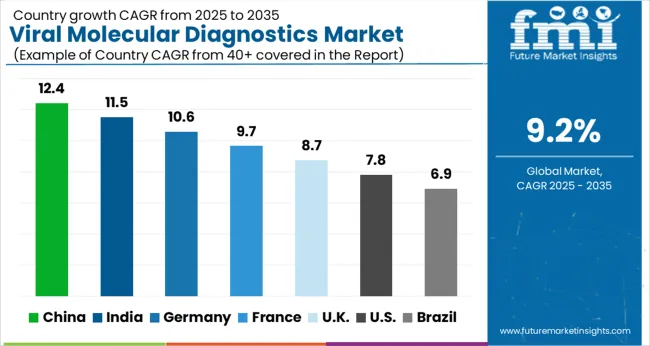
| Country | CAGR |
|---|---|
| China | 12.4% |
| India | 11.5% |
| Germany | 10.6% |
| France | 9.7% |
| UK | 8.7% |
| USA | 7.8% |
| Brazil | 6.9% |
The Viral Molecular Diagnostics Market is expected to register a CAGR of 9.2% during the forecast period, exhibiting varied country level momentum. China leads with the highest CAGR of 12.4%, followed by India at 11.5%. Developed markets such as Germany, France, and the UK continue to expand steadily, while the USA is likely to grow at consistent rates. Brazil posts the lowest CAGR at 6.9%, yet still underscores a broadly positive trajectory for the global Viral Molecular Diagnostics Market. In 2024, Germany held a dominant revenue in the Western Europe market and is expected to grow with a CAGR of 10.6%. The USA Viral Molecular Diagnostics Market is estimated to be valued at USD 4.1 billion in 2025 and is anticipated to reach a valuation of USD 8.6 billion by 2035. Sales are projected to rise at a CAGR of 7.8% over the forecast period between 2025 and 2035. While Japan and South Korea markets are estimated to be valued at USD 503.9 million and USD 354.0 million respectively in 2025.
| Item | Value |
|---|---|
| Quantitative Units | USD 11.1 Billion |
| Product Type | PCR-based Diagnostics, Next-Generation Sequencing, Microarray Diagnostics, Isothermal Amplification, and Others |
| Application | Infectious Disease Detection, Oncology, Genetic Testing, Blood Screening, and Others |
| Application | Infectious Disease Detection, Oncology, Genetic Testing, Blood Screening, and Others |
| End User | Hospitals, Diagnostic Laboratories, Academic and Research Institutes, and Others |
| Technology | Real-time PCR, Digital PCR, Sequencing, Hybridization, and Others |
| Regions Covered | North America, Europe, Asia-Pacific, Latin America, Middle East & Africa |
| Country Covered | United States, Canada, Germany, France, United Kingdom, China, Japan, India, Brazil, South Africa |
| Key Companies Profiled | Abbott, Bio-Rad Laboratories, Danaher, Siemens Healthineers, bioMérieux, F. Hoffmann-La Roche Ltd., Agilent Technologies, Hologic, DiaSorin, and Thermo Fischer Scientific Inc. |
The global viral molecular diagnostics market is estimated to be valued at USD 11.1 billion in 2025.
The market size for the viral molecular diagnostics market is projected to reach USD 26.9 billion by 2035.
The viral molecular diagnostics market is expected to grow at a 9.2% CAGR between 2025 and 2035.
The key product types in viral molecular diagnostics market are pcr-based diagnostics, next-generation sequencing, microarray diagnostics, isothermal amplification and others.
In terms of application, infectious disease detection segment to command 28.9% share in the viral molecular diagnostics market in 2025.






Our Research Products

The "Full Research Suite" delivers actionable market intel, deep dives on markets or technologies, so clients act faster, cut risk, and unlock growth.

The Leaderboard benchmarks and ranks top vendors, classifying them as Established Leaders, Leading Challengers, or Disruptors & Challengers.

Locates where complements amplify value and substitutes erode it, forecasting net impact by horizon

We deliver granular, decision-grade intel: market sizing, 5-year forecasts, pricing, adoption, usage, revenue, and operational KPIs—plus competitor tracking, regulation, and value chains—across 60 countries broadly.

Spot the shifts before they hit your P&L. We track inflection points, adoption curves, pricing moves, and ecosystem plays to show where demand is heading, why it is changing, and what to do next across high-growth markets and disruptive tech

Real-time reads of user behavior. We track shifting priorities, perceptions of today’s and next-gen services, and provider experience, then pace how fast tech moves from trial to adoption, blending buyer, consumer, and channel inputs with social signals (#WhySwitch, #UX).

Partner with our analyst team to build a custom report designed around your business priorities. From analysing market trends to assessing competitors or crafting bespoke datasets, we tailor insights to your needs.
Supplier Intelligence
Discovery & Profiling
Capacity & Footprint
Performance & Risk
Compliance & Governance
Commercial Readiness
Who Supplies Whom
Scorecards & Shortlists
Playbooks & Docs
Category Intelligence
Definition & Scope
Demand & Use Cases
Cost Drivers
Market Structure
Supply Chain Map
Trade & Policy
Operating Norms
Deliverables
Buyer Intelligence
Account Basics
Spend & Scope
Procurement Model
Vendor Requirements
Terms & Policies
Entry Strategy
Pain Points & Triggers
Outputs
Pricing Analysis
Benchmarks
Trends
Should-Cost
Indexation
Landed Cost
Commercial Terms
Deliverables
Brand Analysis
Positioning & Value Prop
Share & Presence
Customer Evidence
Go-to-Market
Digital & Reputation
Compliance & Trust
KPIs & Gaps
Outputs
Full Research Suite comprises of:
Market outlook & trends analysis
Interviews & case studies
Strategic recommendations
Vendor profiles & capabilities analysis
5-year forecasts
8 regions and 60+ country-level data splits
Market segment data splits
12 months of continuous data updates
DELIVERED AS:
PDF EXCEL ONLINE
Viral Safety Testing Market Size and Share Forecast Outlook 2025 to 2035
Viral Vector Development Market – Growth & Demand 2025 to 2035
Viral RNA Extraction Kit Market - Trends & Forecast 2025 to 2035
Viral Pneumonia Treatment Market
Antiviral Drugs Market Size and Share Forecast Outlook 2025 to 2035
Antiviral Immunoglobulin Market Growth – Trends & Forecast 2025 to 2035
Antiviral Drug Packaging Market Insights - Growth & Trends 2025 to 2035
Antiviral Polymers for Packaging Market
HIV Antivirals Market Size and Share Forecast Outlook 2025 to 2035
Swab and Viral Transport Medium Market Insights - Demand & Forecast 2025 to 2035
Key Players & Market Share in Swab and Viral Transport Medium Industry
Influenza Antiviral Market
China Swab and Viral Transport Medium Market Trends – Size, Demand & Industry Outlook 2025-2035
Sterile and Antiviral Packaging Market Forecast and Outlook 2025 to 2035
Arthropod-borne Viral Infections Testing Market Size and Share Forecast Outlook 2025 to 2035
France Swab and Viral Transport Medium Market Report - Growth, Trends & Forecast 2025 to 2035
Germany Swab and Viral Transport Medium Market Insights - Demand, Size & Industry Trends 2025 to 2035
Direct-acting Antiviral Medicines Market
United States Swab and Viral Transport Medium Market Outlook - Size, Share & Industry Trends 2025 to 2035
United Kingdom Swab and Viral Transport Medium Market Analysis - Trends, Growth & Forecast 2025 to 2035

Thank you!
You will receive an email from our Business Development Manager. Please be sure to check your SPAM/JUNK folder too.
Chat With
MaRIA